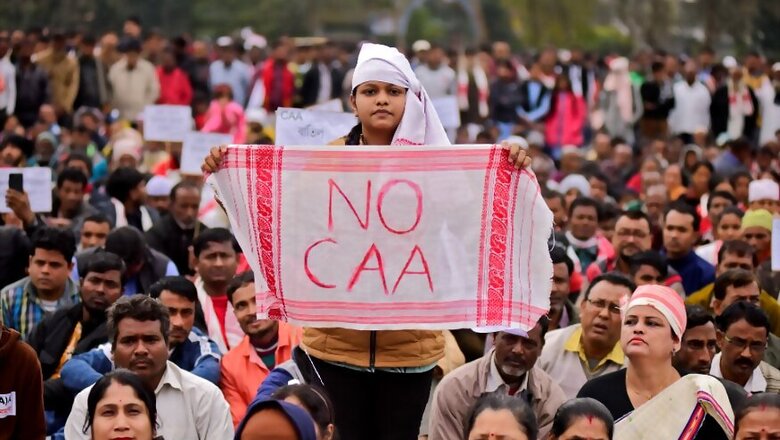
views
Guwahati: The high-powered committee appointed by the Union Home Ministry for implementation of Clause 6 of Assam Accord is upset by the "premature leak" of recommendations in its final report that would provide "constitutional, legislative and administrative safeguards" for the Assamese people.
“It is unfortunate that such information is out in media. We have apprised the Union Ministry of Home Affairs that the report has been finalized. If required, we can travel to New Delhi to submit it - we were told that we might be called after February 18. Let’s see what happens tomorrow,” said a member of the high-powered committee.
Reports said the committee unanimously recommended that 1951 should be the base year for defining indigenous people of Assam who would be eligible for constitutional safeguards under Clause 6 of the Accord. Besides, the committee is also said to have suggested the introduction of Inner Line Permit (ILP) in the entire state along with ways for the protection of land rights. The Home Ministry-appointed committee led by Justice (Retired) Biplab Sarma had finalized a 91-page report on February 10 after holding consultations with various stakeholders.
“Assam will not be out of the Citizenship Amendment Act if 1951 is made the cut-off year, but political and land rights of the indigenous people will be protected provided seat reservations are conceded and land transfer is restricted. We need constitutional protection, but also no CAA - because it is against the constitutional ethos and fraternal harmony of the people,” said former Assam DGP Harekrishna Deka.
On implementing ILP in Assam, Deka said “it is somewhat a deterrent, but not strictly implementable in a state depending on trade and business with the rest of India. Goods and services may suffer. Border protection needs to be very strict.”
Peaceful demonstrations, meanwhile, continue in Assam against Citizenship Amendment Act (CAA) with people demanding a full withdrawal of the legislation, an inquiry into the deaths caused by police firing, and release of rights activist Akhil Gogoi and other Krishak Mukti Sangram Samiti (KMSS) leaders arrested during the anti-CAA movement.
The All Assam Students' Union (AASU) said it would continue to oppose the CAA as the state will not accept any “extra load” till 2014.
“With 1951 as base year, we will get safeguards to take a load of illegal migrants till 1971 – this was a commitment as per the Assam Accord. But the extra load till 2014 is not acceptable, and cannot be a bargaining agenda,” said AASU general secretary Lurinjyoti Gogoi, adding that the CAA violates the provisions of the Assam Accord. According to Clause 5 of Assam Accord, foreigners who came to Assam on or after March 25, 1971, shall continue to be detected, deleted and expelled in accordance with the law.
According to sources, with the recommendation of 1951 as base year, the indigenous Assamese people and their descendants included in 1951 National Register of Citizens (NRC) - irrespective of community, caste, language, religion or heritage will be entitled to constitutional safeguards.
“Who will be 'Assamese', or how will the indigenous people will be defined for these constitutional safeguards? Everyone included in the NRC will have all citizenship rights of every other Indian citizen of India as elsewhere. But constitutional safeguards are being sought for the people of indigenous origin who lived in Assam prior to India becoming a sovereign republic. If the indigenous people includes all people, irrespective of their religion or language, domiciled in Assam at the time of the enforcement of the Constitution in 1950, the only reference document available for this purpose is the NRC of 1951,” said Harekrishna Deka.
“It is possible that in that NRC names of many genuine citizens did not find place for poor census exercise. So, any family having documents relevant to that time would have to be included on proof of such documents. But immigrants coming after that date, though accepted as citizens, cannot be termed as domiciled in Assam before India became republic - if they were not in the geographical area of then Assam,” he further explained.
Earlier on February 7, Prime Minister Narendra Modi while addressing a rally in Assam had assured that the Central government will work expeditiously to implement Clause 6 of Assam Accord once the high-powered committee submits its report.




















Comments
0 comment